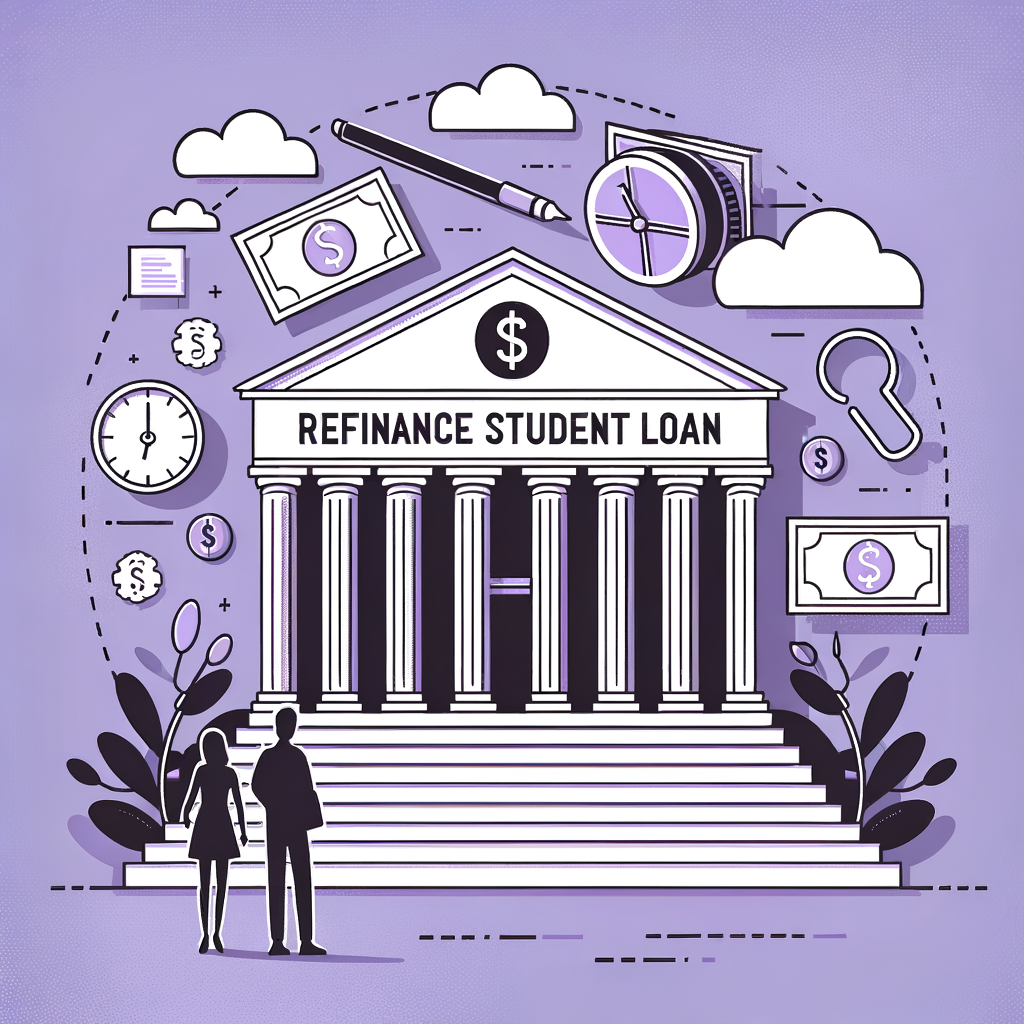Advertiser Disclosure
Last update: March 30, 2025
6 minutes read
How to Refinance Student Loans with Bad Credit
Learn key steps to refinance student loans with bad credit, plus tips to improve your approval chances and lower your rates.

By Brian Flaherty, B.A. Economics
Edited by Rachel Lauren, B.A. in Business and Political Economy
Learn more about our editorial standards



By Brian Flaherty, B.A. Economics
Edited by Rachel Lauren, B.A. in Business and Political Economy
Learn more about our editorial standards
Stuck with big monthly payments from your student loans? Thinking about changing things up with loan refinancing but worried because your credit isn't great? Don't stress! Refinancing means swapping your current debt for a new loan with better terms. Even if your credit isn't perfect, you might still have options.
In this guide, we'll help you figure out how to refinance your student loans with bad credit. We'll talk about how credit scores affect refinancing, ways to improve your chances, and the good and not-so-good parts of making this move.

Key takeaways
- A credit score above 650 gives you a fighting chance at refinancing your student loans
- Refinancing with bad credit might get you a lower monthly payment or consolidate debts, but be careful, as you will likely pay more interest
- A credible co-signer could boost your loan application and lead to better terms
Can you refinance student loans with bad credit?
Refinancing student loans might feel tough if your credit score isn't super high, but don't worry. Bad credit doesn't always mean you can't refinance. While that credit score number is important, it doesn't always shut the door on refinancing. There are still options that could work well for your wallet.
What credit score do lenders look for?
When you apply to refinance a student loan, most lenders prefer a credit score of 650 or higher. If your score is above 650, that's good news – it makes it more likely for you to get approved for a loan with better terms and lower interest rates.

TuitionHero Tip
Keep in mind, though, the exact score needed can vary based on the type of loan and the lender's rules. It's smart to talk to the lender directly to know what they're looking for when you apply for the specific loan you want.
Will refinancing with bad credit improve my interest rates?
Refinancing with bad credit might not get you lower interest rates. People with lower credit scores often find it hard to get better rates when they want to refinance loans. That's because lenders look at credit scores to figure out how risky a borrower is, and lower scores mean more risk.
But everyone's financial situation is different, and there could be lenders or special refinancing choices for people with not-so-great credit. It's a good idea to check with different lenders to see if there are any options that might give you better terms. Refinancing has different parts, like closing costs and origination fees, so you need to factor in other costs as well.
Also, working on making your credit better over time might open up better refinancing chances down the road. If you're not sure what to do, talking to financial experts can help you figure out what's best for you.
How can I refinance my student loans with credit challenges?
Refinancing student loans when you have credit challenges might seem hard, but there are steps you can take:
- Check your credit report: Look at your credit report to make sure there are no mistakes. Fixing them can boost your credit score.
- Explore federal loan options: If you have federal loans, check first with your servicer to see if there are any plans based on your income or access to forgiveness programs. These don't care much about your credit score and can make payments easier. Federal loans will often have better terms than private loans.
- Find lenders for credit challenges: Some lenders understand credit challenges. Look for these flexible lenders who may consider more than just your credit score.
- Think about a co-signer: Having someone with better credit co-sign your loan can improve your chances. Remember, while you are responsible for paying back the loan, they will be on the hook if you can’t make your payments.
- Build your credit first: Work on improving your credit before applying. Make timely payments, resolve any delinquencies, and fix credit report issues.
- Compare lenders: Shop around and compare offers from different lenders. Look at interest rates, repayment terms, fees, and customer service. Some lenders are more open to working with those with credit challenges.
- Consider rehabilitation or consolidation: For federal loans, rehabilitating or consolidating them may help your credit. The government is also offering a unique “Fresh Start” program for defaulted student loans - but it’s temporary, so act quickly to take advantage.
- Get professional advice: Talk to a financial advisor or student loan expert for personalized advice. They can help you figure out the best options for your situation.
What should you remember before making the refinance leap?
Before diving into refinancing, remember a few crucial points. Check your credit score and report for accuracy, as a good credit score helps get you better deal terms. If you have federal student loans, think twice, as refinancing with a private lender means losing federal benefits.
Check out interest rates, loan terms, and fees from different lenders to find the best deal. Think about having a co-signer and make sure you can handle the new repayment terms by looking at your financial situation.
Also, think about your plans and get advice from a financial expert to make a smart decision that matches your goals. Refinancing is a big move, so understand everything before you go for it.
Compare private student loans now
TuitionHero simplifies your student loan decision, with multiple top loans side-by-side.
Compare Rates
Dos and don'ts of refinancing your student loans with bad credit
When you're trying to improve your student loans by refinancing, and your credit score isn’t super high, it's important to be careful. There are certain things you should do and things you should avoid to make sure you get a better loan deal.
Do
Get prequalified with multiple loans to understand where you stand without hard inquiries on your credit.
Apply with a credible cosigner if possible to improve approval odds and potentially secure better rates.
Check your credit report for mistakes and dispute any that you find to potentially boost your score.
Consider lenders that cater to borrowers with bad credit and those willing to evaluate approval factors beyond credit score.
Weigh the potential benefits against the long-term costs of refinancing your student loans.
Don't
Assume one rejection means all doors are closed. Different lenders, different chances.
Forget about the risks to your co-signer. It's just as much their loan as it is yours.
Neglect your credit score before applying. It is a key factor in your refinancing journey.
Overlook the total cost of refinancing and interest over time
Rush into an agreement without reading the fine print on terms and conditions.

Advantages and disadvantages of refinancing student loans with bad credit
Thinking about refinancing student loans with a not-so-great credit score is a big decision. It could have benefits, but there are also some drawbacks. It's important to know both the pros and the cons before you make up your mind.
- Lock in a lower monthly payment, usually the result of a longer repayment timeline
- The potential to save on interest if your credit has improved since your original loans
- Streamline your monthly bills by consolidating multiple loans into one
- It might be a chance to work with a new lender offering better customer incentives
- Refinancing could lead to higher total interest costs due to a longer repayment period
- Risk losing federal loan benefits when you refinance with a private lender
- Be prepared for potentially higher rates due to your credit history
- Your application could place a burden on your co-signer if you’re unable to keep up the payments

Why trust TuitionHero
At TuitionHero, we simplify student loan refinancing. We connect you with trusted lenders for loans and scholarships while offering tools to navigate FAFSA and find student-friendly credit cards. Our goal is to empower you with financial knowledge for a brighter future. Let us guide you toward smart decisions and financial success.
Frequently asked questions (FAQ)
If you refinance with bad credit, it can temporarily hurt your credit score due to the hard inquiry from the application. It could also affect your debt-to-income ratio if approved, which is a factor lenders consider for future loans. However, if you secure a refinance with a lower interest rate or better terms and consistently make on-time payments, it can ultimately improve your credit standing and borrowing power.
Refinancing after a default can be challenging, but it's not off the table. If you’ve borrowed from the government, this process usually involves rehabilitation of your loans first, which can put you back in good standing to potentially qualify for refinancing. Remember, improving your credit score and finding a co-signer will boost your refinance application.
Directly, the federal government doesn’t offer a refinancing program, but it does provide consolidation for federal student loans, which might unlock alternative payment plans. For private loans, you’ll need to work with private lenders. It's always smart to compare the private student loan offers you might qualify for.
Credit score improvements can take anywhere from a few months to a few years, depending on your specific financial situation and actions taken. Good efforts like paying down existing debt and consistently making on-time payments are key to speedier improvements.
Final thoughts
As we finish talking about dealing with student loans when you have bad credit, remember it might be tough, but it's not impossible. Just take it slow, plan carefully, and get some help, like a co-signer.
This can make your student loan payments easier to handle. Think about your choices, understand the outcomes, and keep your goal of being financially healthy in mind. If you need help figuring things out, TuitionHero has lots of useful info and can guide you in refinancing your student loans for a better financial future.
Source
Author

Brian Flaherty
Brian is a graduate of the University of Virginia where he earned a B.A. in Economics. After graduation, Brian spent four years working at a wealth management firm advising high-net-worth investors and institutions. During his time there, he passed the rigorous Series 65 exam and rose to a high-level strategy position.
Editor

Rachel Lauren
Rachel Lauren is the co-founder and COO of Debbie, a tech startup that offers an app to help people pay off their credit card debt for good through rewards and behavioral psychology. She was previously a venture capital investor at BDMI, as well as an equity research analyst at Credit Suisse.
At TuitionHero, we're not just passionate about our work - we take immense pride in it. Our dedicated team of writers diligently follows strict editorial standards, ensuring that every piece of content we publish is accurate, current, and highly valuable. We don't just strive for quality; we aim for excellence.
Related posts
While you're at it, here are some other college finance-related blog posts you might be interested in.
Shop and compare student financing options - 100% free!

Always free, always fast
TuitionHero is 100% free to use. Here, you can instantly view and compare multiple top lenders side-by-side.

Won’t affect credit score
Don’t worry – checking your rates with TuitionHero never impacts your credit score!

Safe and secure
We take your information's security seriously. We apply industry best practices to ensure your data is safe.
Finished scrolling? Start saving & find your private student loan rate today
Compare Personalized Rates




